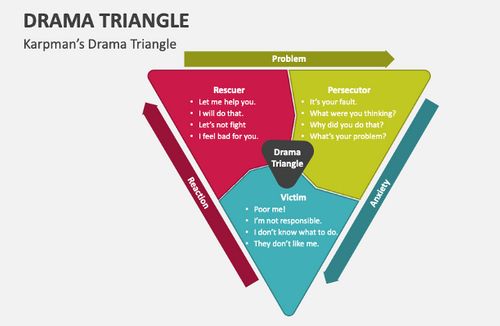The Karpman Triangle: Unveiling its Power and Practical Applications
May 25, 2023 · 2 mins read
0
Share

In 1968, Stephen Karpman developed a model for understanding interpersonal conflict. Today it is a widely used psychological tool to help people transcend feelings of powerlessness in complicated relationship dynamics through personal responsibility.

Save
Share
The model centers around the idea that people shift between these 3 roles which feed into one another and create endless conflict (or drama) and can be emotionally destructive for all involved. The roles are:
Save
Share
The Victim: One who is helpless, powerless and feels stuck due to everyone else's actions. They seek pity, guilt trip others and try to control using emotional manipulation. If they are victimized to a certain point they eventually shift to one of the other roles.
Save
Share
The Rescuer: They take on the problems of others more than their own. They over-function to help others, taking on more than is sustainable until they are forced into one of the other roles.
Save
Share
The Persecutor: Self-righteous bully who tries to correct and control others. If their corrections aren't accepted well, they shift to one of the other roles.
Save
Share
Often people have a natural role learned in childhood that they jump into as soon as conflict arises. These roles can exist between numerous people, but they can often occur internally as well as people's view of themselves change
Save
Share
Escaping the drama triangle is possible for The Victim by recognizing and taking opportunities to help yourself. The Rescuer should not take on other people's problems, but teach others to solve their own issues. The Prosecutor should be firm but fair and willing to compromise.
Save
Share
Transcending all 3 roles is possible and best for every relationship by not cornering yourself and others into these 3 types. Instead, remember that you always have the responsibility and ability to show up as the person you want to be regardless of the words/actions of others.
Save
Share
If you find yourself in repetitive arguments that get nowhere, or have recurring issues that never seem to resolve, you may want to dig into your own thought process and your interactions with others to see if you might be inadvertently feeding into this drama triangle dynamic.
Save
Share
If you enjoyed this Memo follow me @scienceofselfcare and check out this similar Memo that I think you'll enjoy:
Save
Share
0